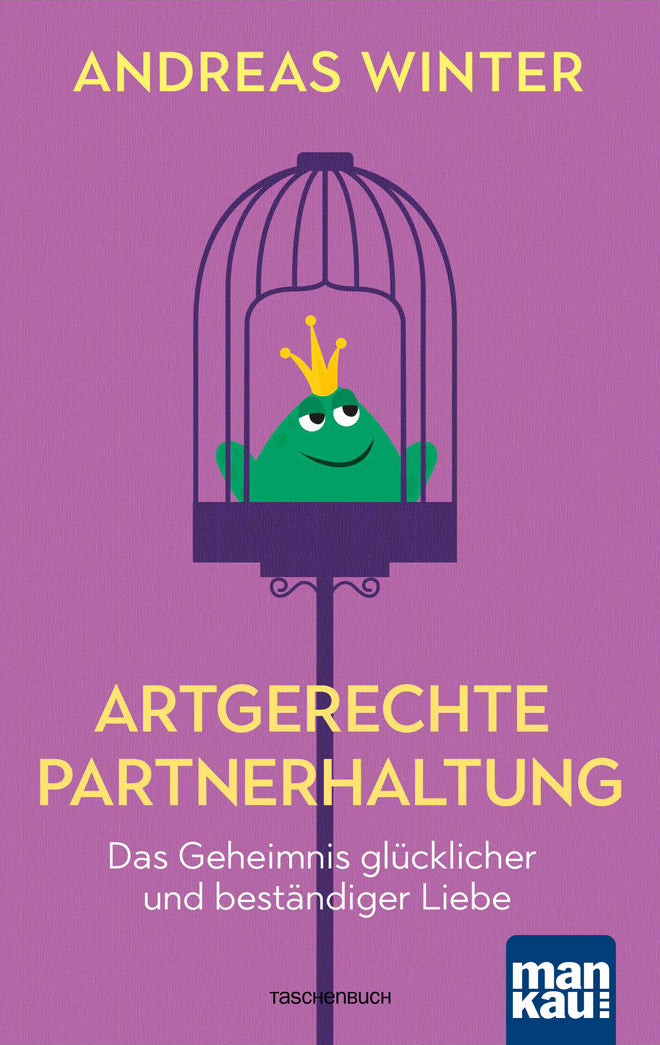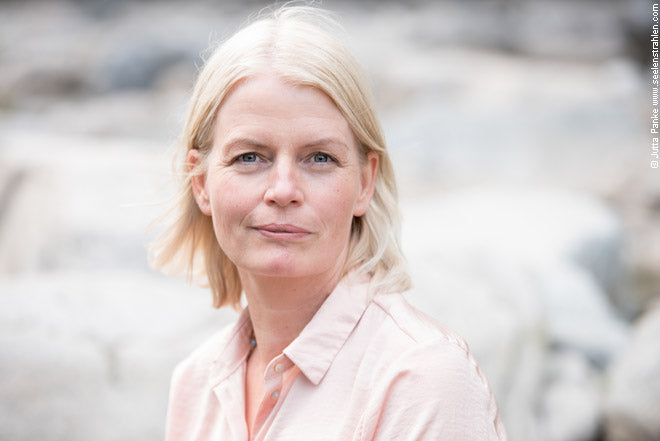
Andreas Winter on relationships and partnerships: “Relationship skills are something you have to learn first – but anyone can do it!”
Andreas Winter on relationships and partnerships: “Relationship skills are something you have to learn first – but anyone can do it!”
"In my opinion, there is only one reason why many relationships are tired and more or less full of conflict: we don't really know our partners. We often have expectations of them that they cannot fulfill! But our expectations lead to disappointment... and stress!" Bestselling author and qualified teacher Andreas Winter , whose guidebook "Artgerechte Partnerhaltung" has now been published in an updated and completely revised paperback edition, explains what creates false expectations and how we can learn to better understand ourselves and our partner's needs - for a happy and lasting relationship.
Your love guide "How to keep your partner in a species-appropriate way" is now being published as an updated version for the third time in over ten years. Why does the topic keep you going and what is special about the new edition?
Winter: The topic of relationships is one of the most important for us humans, alongside work and health. If a relationship doesn't work out, it can put a lot of strain on a person and weaken them. A troubled relationship can make you mentally and physically ill. The reason I've taken up the topic again is that our society is changing. Not only is globalization causing cultures and ethnicities to mix, but the lack of knowledge about the characteristics and differences is also increasingly becoming a source of conflict. The new paperback version also gave me the opportunity to record this book, which is so important to me, as an audio book.
Broken hearts, divorce wars and loneliness are a billion-dollar market for doctors, psychologists, dating agencies, the entertainment industry and the church. What sets your coaching approach apart from your colleagues in the “happiness economy”?
Winter: Probably because, as a scientist, I try to get to the bottom of the real causes and always think in terms of solutions and not in a problem or process-oriented way. For me, it's not about "consoling" or "suppressing", but only "resolving"! Relationship problems and their effects are of course a lucrative long-term business. If you keep prescribing pills for depression, finding a short-term unsuitable partner to combat loneliness, or trying to numb their longing with alcohol or romance novels, they'll just remain a long-term customer. But at some point you lose credibility as a real helper. So I say: If we have the knowledge, the approach and the tools to bring people into a conflict-free and harmonious relationship, then we are obliged to do it. And it works brilliantly! Many people who have really understood themselves and the other person feel that the relationship is suddenly less stressful and the quality of life is therefore higher.
A happy relationship is considered, alongside prosperity and health, to be the most important feature of quality of life. Why does this often lead to major difficulties?
Winter: Because we are not enlightened! Who knows what sociological and psychological effects it has if someone is a second-born child, has a strong bond with their father, had a long birth or was born by Caesarean? Knowledge about us humans is considered expert knowledge in this country! We know neither the characteristics of others nor our own, and we often lack self-awareness! Anyone who does not feel understood is frustrated; anyone who expects something from others that they cannot expect is jeopardizing family peace. Added to this are traditional beliefs and conventions from past eras that have no positive function today, such as the oath of loyalty. Loyalty is important for a stable partnership, but feeling obliged to be loyal for better or for worse has often been a reason for murder. I want to clear that up.
In the foreword to your new book, Bernhard Reicher states resignedly that human coexistence has reached a low point. Nevertheless, you optimistically claim that the ability to have relationships can be learned and that it is never too late. What are the prerequisites for this?
Winter: I see it almost the other way round: Bernhard states objectively that something is going seriously wrong at the moment, and the divorce rates prove him right. I say, somewhat resignedly, that this is because you have to learn how to be a good relationship person, like playing the piano or keeping horses. You can't just jump into a relationship and say: "Okay, we're going to stay together 24/7 for the rest of our lives." That doesn't work, or at most only if you don't have high expectations of your partner, like previous generations did. Back then, people were often happy if they had a partner at all. If they also earned money or were hard-working, then that was complete happiness. Nowadays, no one is satisfied with that alone. We expect similarities in culture, education, political opinions, taste in music, age, generation and much more. And then we also want our partners to love us because our parents didn't keep their promise of love to us. But love does not arise from demanding and expecting, but from loving, that is, from giving love, and not from waiting until the other person gives.
You say that a serious cause of relationship problems is hidden behavioral patterns that sabotage one's own ability to love. Where do these come from and how can one best get rid of them?
Winter: Neurons in our brains are already connected during embryonic development, creating certain perception patterns. The neurotransmitters in the mother's blood generate emotions in the unborn baby, which the child then believes to be its own. A jealous mother, for example, who feels betrayed by her partner can assume that her child feels the same and stores these feelings as her own. Mistrust and suspicion, as well as the fear of being abandoned, usually have their origins here and are then brought into the future partnership. Or: An overly strong bond with the opposite-sex parent often means that a "substitute parent" is sought when looking for a partner. An extremely strong rejection of the same-sex parent promotes the phenomenon of so-called homosexuality, i.e. a conflict with one's own gender role. All of this could be avoided or at least resolved.
What is the difference between love and being in love, between partnership and relationship, and why are they so often confused with each other?
Winter: Many people believe that falling in love leads to great love that lasts forever. Unfortunately, that is a mistake. Falling in love results from a narrowing of perception. You focus on what you have in common and only have eyes for what connects you. Similar to some narcotics, such as cocaine or heroin, the so-called "sense of reality" is undermined. People in love have so many endorphins in their blood that they often simply overlook how little the adored partner suits them. By the time this mistake is discovered, you have a gold ring on your finger, because it takes years to really get to know a person and to be able to decide whether you are suited to each other forever. It takes an eternity before you then take the step to break up. Falling in love comes about when you only focus your perception on the other person's characteristics that have something to do with you. Musical taste, interests, fashion style, etc. When you then discover characteristics that you reject in yourself, the butterflies in your stomach are over. Real love is not tied to characteristics. It loves even without having anything in common. This requires an enormous amount of self-confidence so that you don't let yourself be knocked down by the other person's weaknesses.
In order to properly assess a potential partner, you recommend a tool that doesn't exactly have the best reputation: astrology. What are the benefits of horoscopes and how do the star signs affect our ability to love and have relationships?
Winter: First of all, I would like to say that I am a big critic of modern astrologers and I am not talking about horoscopes, but about personality traits. These are apparently fixed from conception and cannot be changed. There may be ideological reasons why the consideration of these traits is frowned upon in our culture and is considered ridiculous or even dangerous. In many societies, for example in Asia, this is definitely different. Perhaps it is also because there are currently no methods of measuring zodiac traits. They can only be observed and proven empirically if one works methodically correctly, but this methodology was completely unknown until around ten years ago. In short: since stress arises when what one experiences and perceives does not correspond to what one has prepared oneself for, or in other words: since blocking stress hormones are secreted when reality is not as one expects, then this means that ignorance of the other person's traits can be a powerful source of stress. But if you don't expect anything from the other person other than their characteristics, because you know them, then life is much more peaceful and relaxed. So those who know things have an advantage.
Book tip:
Andreas Winter: Species-appropriate partner keeping. The secret of happy and lasting love. Mankau Verlag 2019, paperback, 12 x 19 cm, 278 pp., 10.90 euros (D) / 11.30 euros (A), ISBN 978-3-86374-508-0.
Audiobook tip:
Andreas Winter: Species-appropriate partner care. The secret of happy and lasting love. Audio book with coaching. Mankau Verlag 2019, Digifile with 3 audio CDs, total running time approx. 231 min., 19.95 euros RRP (D/A), ISBN 978-3-86374-511-0.
Link recommendations:
More information about the guidebook "Artgerecht Partnerhaltung"
To the reading sample in PDF format
More information about the audio book "Artgerechte Partnerhaltung" (3 audio CDs)
More about the author Andreas Winter
To the Internet forum with Andreas Winter











